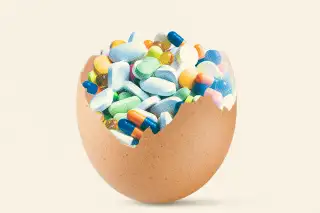"You're Just Peeing Out a Lot of Money." This Is the Real Way You're Flushing Your Retirement Savings Down the Drain

Suze Orman stoked the debate about wasteful spending a few weeks ago when she said that “you're peeing $1 million down the drain” if you buy coffee rather than make it yourself at home.
Money experts have chided Americans about their coffee and avocado toast consumption for years, but there's another candidate vying for the biggest waste of money: dietary supplements. The $32 billion a year industry has Americans hooked, yet new research adds to the mounting evidence that the often costly pills and powders don't improve your health or longevity. A recent large-scale study found that supplements did nothing to extend subjects' lifespans.
Meanwhile, among older adults, 29% reported using four or more supplement products in the past 30 days, according to a 2017 survey. The category includes vitamins, minerals, herbals and botanicals, amino acids, enzymes and other products.
"Most people do not need supplements, they don’t need vitamins, and so they waste a lot of money on these additions that are doing nothing for their health," says Carolyn McClanahan, a certified financial planner at Life Planning Partners, Inc. based in Jacksonville, Fla., who is also a non-practicing medical doctor. "For the most part, you don't need them."
Taking dietary supplements won't necessarily hurt you, but they don't make you healthier, either, McClanahan says—which means you are essentially throwing your money away if you buy them.
"Your body knows the vitamins and minerals it needs," she says. "And anything it doesn't need it pees out. You’re just peeing out a lot of money."
Popular supplements don't come cheap, either — they range anywhere from $15 to $60 and up on Amazon, which can add up to thousands of dollars over the course of a year. For older Americans, that amount of money can make a huge difference in retirement. Your money will do more for your health if you save it for the real and inevitable medical costs of aging in our current healthcare system.
The key to good health at any age is having a well-balanced diet that includes lots of vegetables and fruits, McClanahan says. You should exercise, too. Despite often-aggressive advertising for every manner of quick-fix health and performance-enhancing supplements, there is no shortcut to taking care of yourself. As you get older, you want to do everything possible to maintain your mental and physical health for an optimal quality of life. McClanahan advocates adopting the Mediterranean diet, which has proven health benefits.
To be sure, there are people with genuine medical problems who may need to take supplements, "but only if their doctor tells them they need to take a supplement because they have a specific issue," she says.
If you're too busy to cook, meal kit delivery services are another option for cooking healthy meals, plus they help cut out some trips to the grocery store (you can also order food from companies like Fresh Direct and Amazon if you don't have time to grocery shop). McClanahan likes to cook at home. She spends a few hours prepping and cooking in bulk on Sundays so her meals for the week are already taken care of, which keeps down her food costs and allows her to save more.
The bottom line? Unless your doctor tells you otherwise, don't spend your hard-earned money on supplements — if anything, buy yourself that healthy avocado toast (just don't tell Suze).